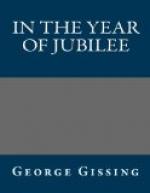’Yes; that is to say, only the fit survive. A very good thing— when other people’s children are in question. But I should kill myself in taking care of them, if I had a large family.’
‘I have known mothers who did,’ Mary remarked.
’It comes to this. Nature doesn’t intend a married woman to be anything but a married woman. In the natural state of things, she must either be the slave of husband and children, or defy her duty. She can have no time to herself, no thoughts for herself. It’s a hard saying, but who can doubt that it is Nature’s law? I should like to revolt against it, yet I feel revolt to be silly. One might as well’I revolt against being born a woman instead of a man.’
Mary reflected, but held her peace.
‘Then comes in money,’ pursued Nancy, ’and that alters the state of the case at once. The wife with money says to people: Come here, and be my slaves. Toil for me, whilst I am enjoying myself in ways that Dame Nature wouldn’t allow. I want to read, to play music, to see my friends, to see the world. Unless you will slave for me, I can’t budge from nursery and kitchen.—Isn’t it a queer thing?’
The less sophisticated woman had a difficulty in catching Nancy’s point of view. She began to argue that domestic service was no slavery.
‘But it comes to that,’ Nancy insisted. ’And what I mean is, that the thought has made me far more contented than I was at first. After all, one can put up with a great deal, if you feel you’re obeying a law of Nature. Now, I have brains, and I should like to use them; but Nature says that’s not so important as bringing up the little child to whom I have given life. One thought that troubles me is, that every generation of women is sacrificed to the generation that follows; and of course that’s why women are so inferior to men. But then again, Nature says that women are born only to be sacrificed. I always come round to that. I don’t like it, but I am bound to believe it.’
‘Children grow up,’ said Mary, ‘and then mothers are free.’
’Free to do what? To think of what they might have done in the best years of their life.’
It was not said discontentedly; Nancy’s mood seemed to be singularly calm and philosophical. She propped her chin on her hand, and gazed at the fire.
‘Well,’ remarked Mary, with a smile, ’you, at all events, are not one of the poorest women. All seems to be going well, and you will be able, I am sure, to get all the help you need.’
’Perhaps. But I shall never feel quiet in my conscience. I shall feel as if I had defeated Nature by a trick, and fear that she’ll somehow be revenged on me.’
This was quite beyond Mary’s scope of thought, and she frankly said so.
‘One thing I’m quite sure of, Nancy,’ she added, ’and that is, that education makes life very much harder to live. That’s why I don’t hold with educating the poor—not beyond reading and writing. Without education, life is very plain, though it may be a struggle. But from what I have seen of highly-taught people, I’m very sure they suffer worse in their minds than the poor ever do in their bodies.’




